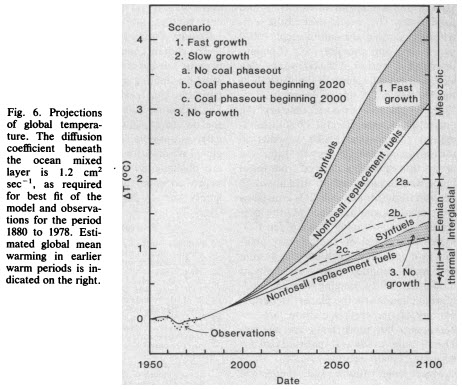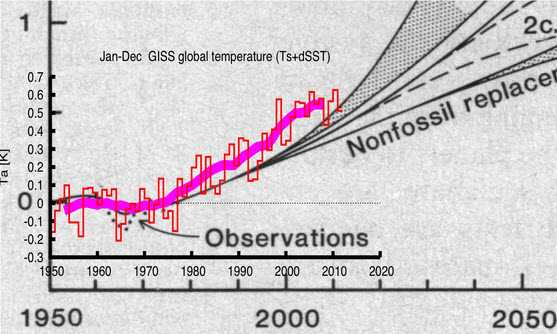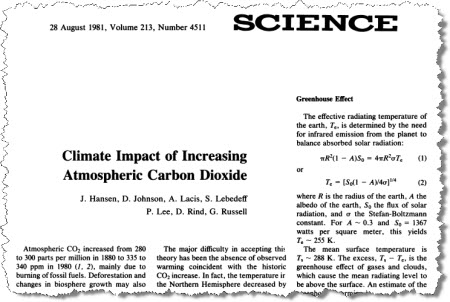A seminal article by climate scientists in 1981 has proved eerily accurate at predicting global temperature rises over the past three decades, with its lead author James Hansen telling Crikey that his early research on global warming “seems to hold up remarkably well”.
Hansen, now one of the world’s leading experts on climate science and the head of the NASA Goddard Institute for Space Studies, was one of seven scientists who wrote the 10-page report in Science in 1981 that examined the impact of increased carbon dioxide in the atmosphere.
The New York Times ran a front-page story on it at the time, noting that “the seven atmospheric scientists predict a global warming of ‘almost unprecedented magnitude’ in the next century.”
Dutch scientists Geert Jan van Oldenborgh and Rein Haarsma recently dug up the old report and compared Hansen et al’s projections of global mean temperatures to the actual temperatures of the past three decades and found the 1981 projections to be surprisingly close.
Here’s the original graph from Science, which projects global mean temperatures until 2100. It also takes in to account the phasing out of coal at different times, since coal is a cheap and plentiful resource and the scientists were aware that use of synthetic fuels or renewable energies would take a while.

Here is Oldenborgh and Haarsma’s graph, which has overlaid Hansen et al’s graph with the data from the past 31 years.

“Given the many uncertainties at the time, notably the role of aerosols, the agreement is very good indeed,” write Oldenborgh and Haarsma at Real Climate. “They only underestimated the observed trend by about 30%, similar or better in magnitude than the CMIP5 models over the same period (although these tend to overestimate the trend, still mainly due to problems related to aerosols).”
Why was it slightly underestimated? “Assumed climate sensitivity to doubled CO2, for our primary simulation then, was 2.8C. We now suggest 3C, so it may have been slightly low,” explained Hansen. “Overall it should be quite accurate, if observed climate forcings are used.”
Hansen told Crikey that he’d made mention of the Science article in his recent TED talk — titled “Why I must speak out about climate change” and he assumes that’s why Oldenborgh and Haarsma investigated it.
Not that the 1981 report was Hansen’s first look at climate models. “I became involved in climate calculations for Earth in the middle 1970s, publishing a paper on the effect of Mount Agung on global temperature in 1978, I believe, and a paper on the effect of several trace gases in 1976, and working on a 3-D climate model, providing results to the famous Charney study in 1979,” he said.
Climate science as developed significantly since 1981, says Australian palo-climate scientist Andrew Glikson from the Australian National University. These include a clearer understand of the role of the oceans and the magnitude of their feedbacks, the role of aerosols, projecting tipping points, the connection between climate change and extreme weather events, the study of ice cores and the development of paleoclimate science.
“An awful lot has been learnt since then but the principles and projections of the system have been determined quite accurately by Hansen and his group,” Glikson told Crikey.
Hansen has been an outspoken member of the climate science community for many years, and has ever been arrested several times for his involvement in environmental protests. His activist attitudes have come under attack from his own NASA colleagues in recent days. A letter released overnight, signed by 49 former NASA scientists and astronauts, criticises NASA’s public crusading on climate change. The letter was sent late last month to NASA administrator Charles Bolden. It reads in part:
“We believe the claims by NASA and GISS, that man-made carbon dioxide is having a catastrophic impact on global climate change are not substantiated, especially when considering thousands of years of empirical data. With hundreds of well-known climate scientists and tens of thousands of other scientists publicly declaring their disbelief in the catastrophic forecasts, coming particularly from the GISS leadership, it is clear that the science is NOT settled.
“The unbridled advocacy of CO2 being the major cause of climate change is unbecoming of NASA’s history of making an objective assessment of all available scientific data prior to making decisions or public statements.”
But Glikson said he did not recognise any of the 49 names from the list as climate scientists and instead said most appeared to be astronauts, engineers and various technical specialists, and therefore from a scientific point of view their arguments were not based in peer review-based science.









A useful definition of science is any systematic knowledge that is capable of resulting in a correct prediction or reliable outcome.
However, it is apparent deniers will never be swayed to the detriment of us all.
Bollocks! Every academic, no …make that every person is beholden to a master upon whom he depends. 15th Century artists painted their patrons as disciples in endless Last Suppers because they needed to ingratiate themselves on a continuous basis to their benefactors.
Nowadays every public or even private institution has the ass out of its trousers and is desperate for funding. The Feds even pull this stunt on us by making us comply with their political will for fear of losing funding.
Corporations fund think tanks and Big Pharma funds the medicos and somehow they all always come up with solutions that suit their backers or their backers foundations and associations.
I want to know who represents the interests of all the people without money?
What the money wants to happen is invariably what happens.
As Taylor Caldwell writes for industrialist Joseph Armagh in The Captains and the Kings, “it is government of the money, for the money, by the money” and science is no Robinson Crusoe here.
As for scientists – why would they be any different? They are smart enough to demonstrate any effect they can conceptualise if they structure the experiment in the appropriate way and ignore things that don’t support the targeted outcome. So good luck anyone with securing funding if you don’t pay homage to the industrial zeitgeist crafted by the powers that be.
Nope nothing is sacred any more and as for Hansen.. say no more! Wicked eh!
A subconscious sense of guilt for pursuing personal affluence seems to motivate alot of the criticism of climate science.
Bohemian, what a crock. These scientific organisations came to the same conclusions under the right wing governments of Bush & Howard who were deniers and didn’t want to know.
James Locklock enabled discovery of ozone depletion and a hole in the ozone layer, was this was another bought and paid for conclusion? Just as well the miners didn’t have a truckload invested in CFC’s or we would all be wearing factor 1,000.
If you can’t back up your assertions you end up sounding just like Monkton and Palmer.
I think that the key here is that action on climate change affects very powerful interests. This seemed not to have been widely realised in the 80’s and 90’s and early in the new century. Political leaders of all persuasions at least listened to what climate scientists had to say and started to think of how we should address the problem. But since the turn of the century, well funded free marketeers and fossil fuel interests, among others, have been mobilising to discredit the science and sow doubt among the voting public. Rather like Big Tobacco denying that smoking caused cancer and continuing to market addictive poison.
The science has been settled among those who have made understanding the Earth’s climate their life’s work. We should be debating how we should deal with what is a very big problem, not whether or not there is a problem.